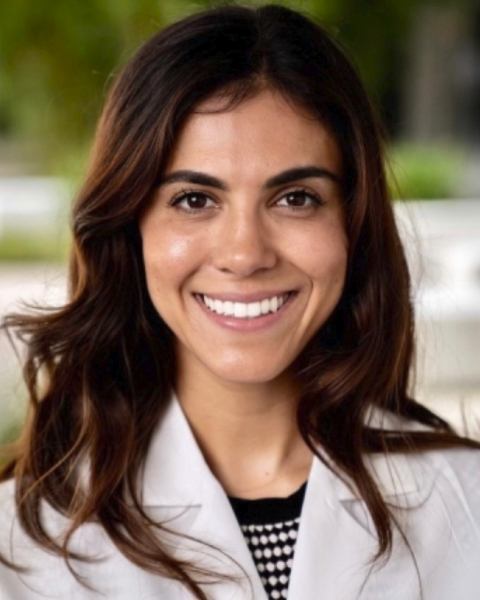PQA 03 - PQA 03 Gynecological Cancer, Pediatric Cancer, and Professional Development Poster Q&A
3476 - Standardizing Research Training in Radiation Oncology Residency: A Pilot Program Evaluation
Monday, September 30, 2024
8:00 AM - 9:00 AM ET
Location: Hall C
Screen: 21

Rojine Ariani, MD, MS
UCLA David Geffen School of Medicine/UCLA Medical Center
Pasadena, CA
Presenter(s)
R. Ariani, T. C. Wu, M. J. Farrell, M. Cao, A. Raldow, A. U. Kishan, S. A. McCloskey, J. B. Weidhaas, M. L. Steinberg, and J. Deng; Department of Radiation Oncology, University of California, Los Angeles, Los Angeles, CA
Purpose/Objective(s): Research scholarship is integral to radiation oncology residency training, yet experiences vary widely, relying heavily on project-specific training. The ability to dedicate research time while maintaining patient care and work-life balance is crucial to promote meaningful experiences during residency. To standardize research training and improve efficiency, we created a pilot program called “How To," which includes of a peer-led seminar series during protected time on developing clinical research skills to accelerate resident-initiated projects. Our objective was to assess the efficacy of the “How To” pilot program. Materials/
Methods: A prospective, anonymous, qualitative survey was conducted at a single institution from 2022 to 2024 following each "How To" seminar: 1) building a database, 2) initiating a clinical trial, 3) performing a meta-analysis, 4) R coding for Kaplan-Meier curves, 5) A programming environment DICOM analyses, and 6) applying for grants. Clinical and physics resident participants were categorized as "junior" (PGY2-3 for clinical and PGY1 for physics) or "senior" (PGY4-5 for clinical and PGY2 for physics). The survey assessed self-reported improvements in knowledge, likelihood of applying gained knowledge, and the perceived value of information from peer leaders on a 5-point Likert scale. Mann-Whitney U performed was conducted to compare scores between juniors and seniors for each seminar.
Results: Between 2022 and 2024, a total of 21 unique residents attended 6 seminars, led by seniors (1 physics, 5 clinical). From the 6 seminars, 61 survey responses were collected, with 51 (83.6%) from clinical residents and 10 (16.4%) from physics residents; with an average survey response rate of 73%. At the time of surveys, 34 (55.7%) responses were from juniors, and 27 (44.3%) responses were from seniors. All responses (100%) indicated agreement or strong agreement that knowledge increased and peer speakers provided valuable information. Almost all (97%) expressed agreement or strong agreement that they would likely apply what they learned, while a minority (3%) expressed neutrality. Median survey scores for improvement of knowledge and likelihood of applying knowledge for the seminar on initiating a clinical trial were significantly higher for seniors than juniors (5 vs 4, respectively; U=2; p=0.048). For all other seminars, there were no significant differences in any survey responses between juniors and seniors.
Conclusion: The “How To” peer-led research pilot program enhanced knowledge in clinical research and career development for all residents, irrespective of training level. All residents found peer speakers to be valuable sources of information. These findings support the integration of a peer-led research curriculum to standardize research training for radiation oncology residents, fostering research heightened growth, efficiency, productivity, and collaboration.
Purpose/Objective(s): Research scholarship is integral to radiation oncology residency training, yet experiences vary widely, relying heavily on project-specific training. The ability to dedicate research time while maintaining patient care and work-life balance is crucial to promote meaningful experiences during residency. To standardize research training and improve efficiency, we created a pilot program called “How To," which includes of a peer-led seminar series during protected time on developing clinical research skills to accelerate resident-initiated projects. Our objective was to assess the efficacy of the “How To” pilot program. Materials/
Methods: A prospective, anonymous, qualitative survey was conducted at a single institution from 2022 to 2024 following each "How To" seminar: 1) building a database, 2) initiating a clinical trial, 3) performing a meta-analysis, 4) R coding for Kaplan-Meier curves, 5) A programming environment DICOM analyses, and 6) applying for grants. Clinical and physics resident participants were categorized as "junior" (PGY2-3 for clinical and PGY1 for physics) or "senior" (PGY4-5 for clinical and PGY2 for physics). The survey assessed self-reported improvements in knowledge, likelihood of applying gained knowledge, and the perceived value of information from peer leaders on a 5-point Likert scale. Mann-Whitney U performed was conducted to compare scores between juniors and seniors for each seminar.
Results: Between 2022 and 2024, a total of 21 unique residents attended 6 seminars, led by seniors (1 physics, 5 clinical). From the 6 seminars, 61 survey responses were collected, with 51 (83.6%) from clinical residents and 10 (16.4%) from physics residents; with an average survey response rate of 73%. At the time of surveys, 34 (55.7%) responses were from juniors, and 27 (44.3%) responses were from seniors. All responses (100%) indicated agreement or strong agreement that knowledge increased and peer speakers provided valuable information. Almost all (97%) expressed agreement or strong agreement that they would likely apply what they learned, while a minority (3%) expressed neutrality. Median survey scores for improvement of knowledge and likelihood of applying knowledge for the seminar on initiating a clinical trial were significantly higher for seniors than juniors (5 vs 4, respectively; U=2; p=0.048). For all other seminars, there were no significant differences in any survey responses between juniors and seniors.
Conclusion: The “How To” peer-led research pilot program enhanced knowledge in clinical research and career development for all residents, irrespective of training level. All residents found peer speakers to be valuable sources of information. These findings support the integration of a peer-led research curriculum to standardize research training for radiation oncology residents, fostering research heightened growth, efficiency, productivity, and collaboration.
